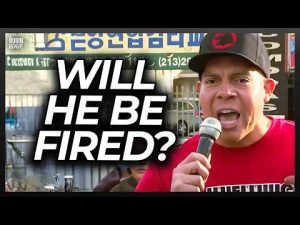**October 7th, A Day of Celebration for Some in New York?**
In a shocking display, hundreds of people took to the streets of New York City on October 7th. Instead of somber remembrance for a tragic terrorist attack in Israel, they were chanting for more violence and terror in America. This was not a scene from overseas; this was happening in one of America’s biggest cities. As the crowds waved flags and demanded a “freer Palestine,” many feared that the uncomfortable truth about the growing Islamist presence in America was being ignored.
On this particular day, many citizens were reminded of the October 7th attacks that took innocent lives, yet the atmosphere on the New York streets suggested that this year was meant for celebration, not reflection. It is baffling, but some individuals seemed to cheer for more chaos. This alarming behavior is only a symptom of a larger issue: the rapid Islamification of America. Unfortunately, this is a topic that many seem hesitant to touch, preferring instead to bury their heads in the sand.
The statistics paint a striking picture. Approximately 9% of New York City’s residents identify as Muslim, equating to around 750,000 people in a city of 8.4 million. With such a significant population, one has to ask: is the so-called “genie” of radical ideology now irretrievably out of the bottle? The reality is that these ideological battles are being fought at the highest levels of government. A recent poll indicates a rising star in the city’s political scene: Zoran Mandani, a candidate seemingly ready to claim the mayoral seat. Many believe his victory in the upcoming election may solidify a shift in the city’s cultural landscape that few are ready to confront.
The troubling part is that Mandani has received significant financial backing from organizations like the Council on American Islamic Relations (CAIR), which has faced accusations of ties to extremist groups. This raises questions about where his loyalties lie. While some politicians dare to speak out against the troubling ramifications, others remain conspicuously quiet. The chorus of dissenters includes individuals like Randy Fine, who laments the perceived ties between Islam and the call for violence in America.
Being politically correct is one thing, but allowing damaging ideologies to infiltrate American culture is another matter entirely. The discomfort surrounding discussions about Islamic extremism must not come at the cost of national integrity. Events like the October 7th protests imply a larger agenda at play, one that challenges the founding values and traditions of the United States. If one were to look at the landscape in the United Kingdom, for example, what’s happening in America might not seem so far-fetched after all.
The reality of the situation is stark. In cities like Dearborn, Michigan, a staggering 55% of the population is Muslim, demonstrating a significant demographic shift. With these statistics, one cannot ignore the implications—cultural transformations follow whenever these mass resettlements occur. It leads to the question: for how long will Americans be expected to tailor their way of life to accommodate the demands of new arrivals? Fear of being branded an Islamophobe should not stifle critical discussions about national security and cultural preservation.
As the nation faces these challenges, it is essential for citizens to engage in open conversations about the future. Addressing the dangers posed by radical ideologies is not about race or hostility; instead, it’s about protecting the ideals that define America. Everyone has a stake in this conversation, and it’s time to speak up for the country that was built on a foundation of freedom and democracy. The stakes have never been higher, and silence is no longer an option.







